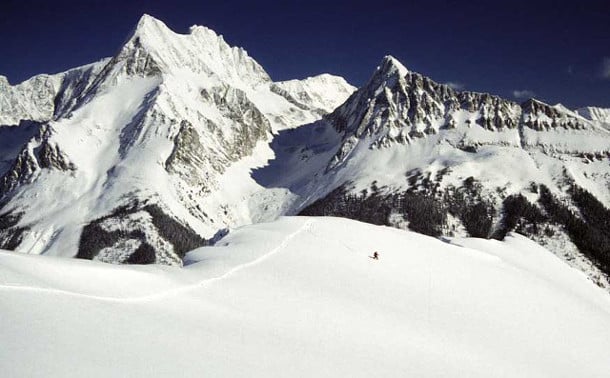The B.C. government is considering pledging a further chunk of cash to prop up a Kootenay municipality that has no residents, no infrastructure, and no tax base.
The council of the Jumbo Glacier Mountain Resort Municipality recently tabled a draft financial plan that anticipates provincial government funding of $200,000 per year over the next five years.
"Why is the government giving five-year funding support of $1 million to a municipality that has no residents, no infrastructure and no investors?" said NDP MLA Norm Macdonald in the legislature on March 25. The development is planned for Macdonald's Columbia River-Revelstoke riding.
In 2013, the new municipality received $260,000 in government start-up money, a payment presumed to be a one-time grant. At the time, Jumbo's provincially appointed new mayor, Greg Deck, said he expected the funds to last a few years. "We are not building a city hall, not hiring full time people," he said last March.
Deck added that once that grant was exhausted, the municipality's only revenue source would be property taxes levied on the owners of the Jumbo development.
The Jumbo Mountain Resort municipality was formed in 2012 after the B.C. government amended the Local Government Act to make possible a municipality without residents or infrastructure and with an appointed council.
It was created specifically to enable the Jumbo development and all-seasons resort in the Purcell Mountains near Invermere. To be constructed on Crown land, the project includes a village of condos, chalets, shops and hotels, and will aim to attract thousands of guests and residents. It would provide 20 lifts for year-round skiing on several nearby glaciers.
'There are real needs for that money': NDP
In response to Macdonald's question, Community, Sport and Cultural Development Minister Coralee Oakes pointed out that "instant towns" similar to Jumbo, such as Whistler and Sun Peaks, also received start-up money and various other government grants.
Macdonald argued that Oakes' comparison wasn't apt because those communities already had residents, investors, and infrastructure in place when they received the grants.
Oakes countered that Jumbo municipal council's budgeting for government grants beyond the start-up year is speculative, and it could apply for funding but might not receive it. She said that the development will create hundreds of jobs and that the government believes in growing the economy.
Macdonald asked the minister to confirm that Jumbo will not get any further funding before it develops a tax base, to which the minister responded that the government wants to grow the economy.
"There are real needs for that money," Macdonald told the minister. "We have asked for dialysis service. No, no provincial money for that. We asked for an abattoir. No provincial money for that. We asked for a rescue truck so that people on the Trans Canada who are injured can be saved. No money for that.
"But the minister still thinks it is a wise investment to spend a million dollars over the next five years on a mayor and council with no people, no buildings, and no investor. How does that make sense at all?"
Development halted by legal challenges, blockades
In an interview, Jumbo Mayor Greg Deck said that creating a five-year financial plan is an obligation for all municipalities. He said grants from senior governments are a standard source of funding for municipalities, whether in the start-up phase or not.
He said council has never discussed its five-year financial plan with the government, and agreed that the inclusion of the annual grants is speculative.
"When I spoke with [The Tyee] last year, I was hopeful that development would have proceeded to the point that we would have assessable property on which to levy taxes," he said. Deck said that legal challenges and blockades have delayed that development.
In one such challenge, the Ktunaxa First Nation argued that the government did not sufficiently consult it before approving the Jumbo project. It was dismissed last week.
The Ktunaxa also argued the development would desecrate their spiritual connection with the area, which they call Qat'muk, the home of the grizzly bear spirit. The government thereby violated the Ktunaxa's freedom of religion under the Charter of Rights, the nation claimed.
The challenge was rejected by the judge, who said the government's consultation "passes the reasonableness standard." The judge did not agree that the development violates Ktunaxa spiritual values or the Charter of Rights.
"It is difficult to describe how frustrated and disappointed we are with the Supreme Court's decision," Ktunaxa Nation Chair Kathryn Teneese said in a recent news release. "Despite this setback, we will continue to explore every avenue to stop development in the heart of Qat'muk."
Since 1991, the Jumbo development has navigated a labyrinth of lobbying, debate, and significant public opposition, successfully passing through the provincial government's environmental assessment process in 2004, with a five-year extension granted in 2008.
In early 2012, the provincial government gave the project the go-ahead by agreeing to Jumbo Glacier Resort Ltd's Resort Master Plan. ![]()
Read more: BC Politics
















Tyee Commenting Guidelines
Comments that violate guidelines risk being deleted, and violations may result in a temporary or permanent user ban. Maintain the spirit of good conversation to stay in the discussion.
*Please note The Tyee is not a forum for spreading misinformation about COVID-19, denying its existence or minimizing its risk to public health.
Do:
Do not: